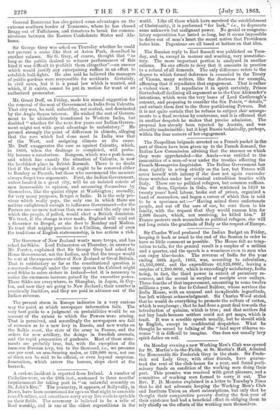Mr. Grant Duff, on Friday, made his annual suggestion for
the removal of the seat of Government in India from Calcutta. That city was, he said, unhealthy, not central, and dominated by the Anglo-Saxon interest. He wished the seat of Govern- ment to be ultimately transferred to Western India, but doubted "whether for the next few years our Indian Govern- ment might not with great advantage be ambulatory." He pressed strongly the point of difference in climate, alleging that the race which had done most in India was that of the West, and assigning climate as the cause. Mr. Duff exaggerates the case as against Calcutta, which, in 1866, when the drainage is completed, will proba- bly become a sanatorium. Rangoon, which was a pest-house, and which has exactly the situation of Calcutta, is now the healthiest place in British Burmah. There is no doubt that if the capital is changed it ought to be removed either to Bombay or Poonab, but those who recommend the measure always forget two arguments. First, the Indian Government, unless located in a great city, will be an isolated coterie of men inaccessible to opinion, and measuring themselves by themselves, like the quaint clique at Washington; secondly, for very many purposes, Bengal 18 India. It is the only pro- vince which really pays, the only one in which there are natives enlightened enough to influence Government—for the Parsees are no more natives than we are—and the only one in which the people, if polled, would elect a British dominion. We trust, if the change is ever made, England will send out a Governor to Bengal, as she does to Bombay and Madras. To trust that mighty province to a Civilian, devoid of even the traditions of English statesmanship, is too serious a risk.






























 Previous page
Previous page